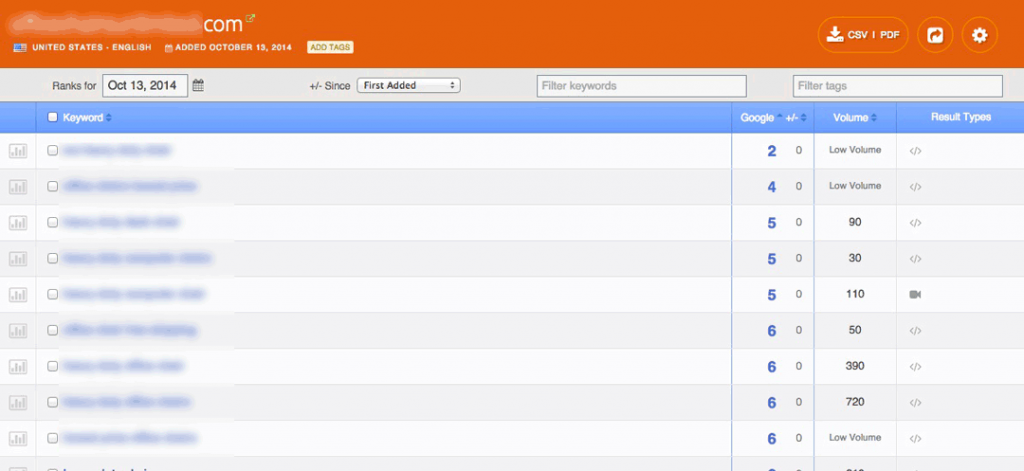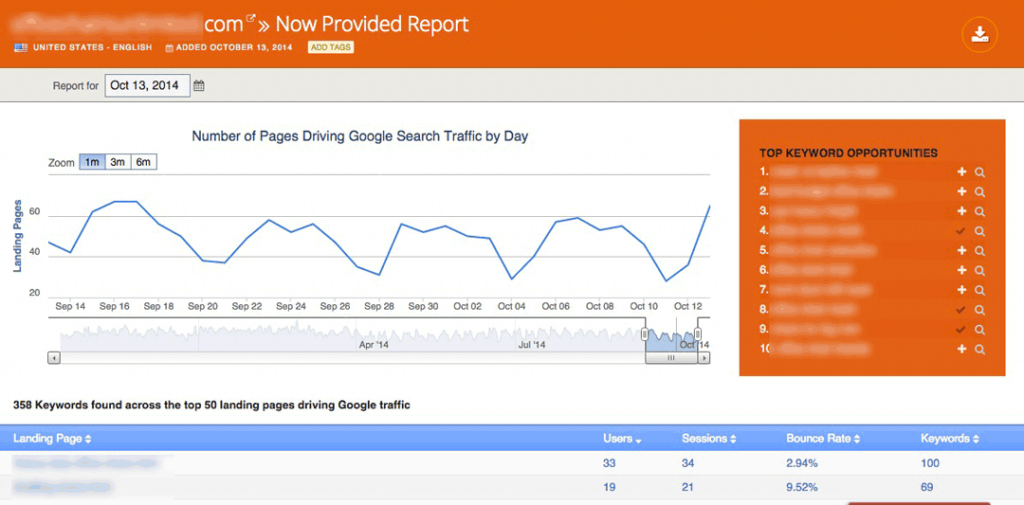SERP Position Tracking Update Coming Soon
An overdue change is on the way…
For about a year, we’ve been providing a dashboard to track your site’s position in organic search for variety of keywords. Over the past few months, it has become increasingly unreliable – both in uptime and in data accuracy. Unfortunately, the source of the data and much of the calculating done in the backend has also been increasing the cost of what they provide. To be fair to them and any other provider of such services, accurate keyword rank tracking has been much more difficult and costly.
A brief history of rank tracking…
A few years ago, there were several reasonably accurate rank tracking tools – but things have changed. Organic search results for a given keyword can vary greatly from one location to the next, and for each user based on their own browsing history. About two years ago, Google took away our toys by blocking most of the major rank tracking providers from the Adwords API – the source of data for most of the tracking tools. And then there is (not provided) keyword data in Google Analytics, which made it much more difficult to see which keywords were actually driving traffic.
The result: The better tool sets like those from Moz and RavenTools have come up with ways to guesstimate the traffic driven by keywords, and have taken to reporting keyword positions based on aggregate data from a variety of sources other than Google’s Adwords API, like SEMRush, Majestic, SearchMetrics, Google Webmaster Tools, and some “proprietary data” sources. Less reliable data, and the processing power required to compile and calculate location-neutral, unpersonalized rankings makes daily updates a lot less practical. None of this stuff is free, so getting somewhat accurate rank tracking on more than a monthly or weekly basis is often more expensive than it is worth. Keyword tracking is often included in the major platforms as sort of a sidebar item – a broad benchmark to go along with the better metrics of traffic and conversions. Even Moz, which I really like, downplays the keyword ranking feature since it is not very precise (they update theirs weekly), nor is it as useful as a metric as it was in the past.
What Does This Mean To You
It currently costs Ker Communications around $70 per month to track just 10-20 keywords per site – sometimes significantly more for lots of keywords, which does make for a somewhat more clear picture of what’s going on in organic search… IF IT IS ACCURATE AND USEFUL!
If you are a daily rank checker, I am sure you have had those heart stopping mornings where it looked like your site disappeared for some keywords, but it did not.
When you combine that cost with the time and expense of monthly reporting, some Ker Communications clients end up in a situation where as much as 20% of your monthly retainer is going towards reporting keyword positions only – not towards something that will actually improve visibility. Reporting accurate and useful information is always a good thing. But when keyword tracking is inconsistent, and arguably less useful in this age of “semantic search” where people often speak lengthy questions as a search query rather than typing one or two keywords… well, we can, and should, do better.
Solution?
I have been working on finding a more cost effective, and reliable way of reporting keyword positions. A recent price increase from the data provider, which would bump that $70 up to about $200 for most client sites, along with some other technical issues, has forced this move to happen earlier than planned.
We are in the process of migrating to a new tracking dashboard which will provide much of the same functionality of the old one – like daily updates (hopefully more accurate), and comparisons to previous time periods. It will also include some new information like estimated search volume to help see which keyphrases are actually useful, and an attempt at a workaround for (not provided) keyword data in the form of a report showing pages that received organic search traffic and likely keyphrases which drove that traffic. Note: At this time, the “not provided” workaround is only available at the admin level, which means we’ll be able to use it to learn more about how your site is found, but it won’t be accessible on the client side for a while.
What Do You Need To Do To Use The New Dashboard?
Current Ker Communications SEO Clients:
Nothing right now. In the next few days, current Ker Communications SEO clients in good standing will receive an invitation to login to the new dashboard.
PPC/Adwords Clients:
The old dashboard did not really have much to offer you, other than a thumbnail graph of overall traffic. The new dashboard is also currently all about Organic Search, but we may be able to add Paid Traffic to it in the future. You will continue to receive reports from Adwords and Google Analytics.
Past Clients:
If you are a past client, we’ve typically allowed access to the dashboard indefinitely as a courtesy, but unfortunately that must come to an end. We may be able to offer the dashboard as an “a la carte” item in the future at a rate that would be lower than if you subscribed to a similar service on your own. If you are interested in that, please let us know and we’ll see if we come up with something.
Sneak Preview
Here are a couple of screenshots from the new dashboard.
Rankings

Like the old dashboard, you’ll be able to track keyword positions and compare to previous time periods. You’ll also get a little more data in regard to search volume.
(Not Provided) Workaround
NOTE: I was just informed that this feature is not quite ready for prime time and will only be available on the Admin side at first. We’ll be able to use this to learn how people are finding your site and improve what we do, but the report will not be available on the client dashboard until later. D’oh!

See the pages that are driving your organic search traffic, along with likely keyphrases – both tracked and previously untracked – that were searched by actual users and fit those pages.
Thank you for you patience and understanding during this transition.
Nick Ker
